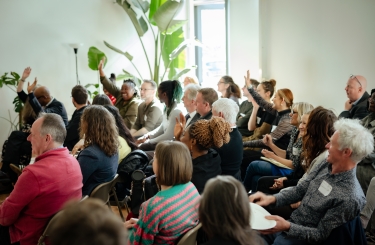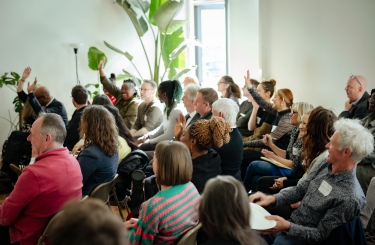

This was building on insights from our previous learning programmes, where we’ve seen a desire from funders to shift the power they hold to communities. We’ve also seen funders reconsidering their relationship to risk in order to do things differently and drive real change for London’s communities.
But we’ve also heard how embedding more equitable decision-making and truly shifting power is sometimes held back by rigid funding processes and cultures. And the available evidence shows that groups led-by-and-for their communities are still not receiving the support they need to deliver their work. Can we help address some of these problems through a more participatory way of working? Can bringing in new voices, perspectives and communities enable funders to take risks they wouldn’t otherwise take?
Participation as a means of shifting power
Through interviews and conversations with members and friends across the funding and civil society sector, we’ve discussed the range of ways ‘participation’ can show up in practice, and explored some of the principles which need to underpin any attempts from the funding system to be more participatory. We heard that participatory funding methods can help rebuild trust with communities who’ve not been given the same access to resources or have been given the power to influence decisions that affect them.
But as Yvonne Field (Ubele Initiative) and Anne-Marie Twumasi (Global Fund for Children) said at our April insight meeting, “participatory grant-making doesn't necessarily lead to more equitable outcomes”. It is “just one of the tools” that funders can use, but equity and justice itself “is about acknowledging the different barriers that there have been for these groups and actually doing things differently”.
As Yvonne highlighted, the most important thing for funders is “taking a step back to assess what they’re trying to achieve”. Is it about dismantling systems of oppression? Is it about reaching a particular community? Is it about handing over your decision-making powers to those who are most affected by the issue you’re trying to solve?
Participation can't just be an empty word.
Cameron Bray, Head of Learning and Participation, Barking and Dagenham Giving
In this webinar, Hayley Roffey (Global Managing Director, Global Fund for Children) made it clear that taking a participatory approach means you have to be prepared to “hand over your power. If you get this one wrong, you might as well not do it at all”. That also means you need to be willing to adapt to feedback from the communities you’ve asked to participate – we heard from those doing participatory work that being able to listen, learn and adapt was key to getting participatory funding right (and accepting that sometimes it’s going to be a bit messy and take time to get right).
Being intentional about participatory practice
Sometimes, participation might not be the right approach for what you’re trying to achieve as a funder. If there is a community or group of people with complex needs that you don’t have the expertise or experience to support through a participatory process, then it could do more harm than good. In cases where the cost of participation is disproportionate to the funding available, participation may also not be the right method (Islington Giving shared some thoughts with us on this, which you can read more about here).
When participation changes systems
Bringing new voices presents an opportunity to review and change existing processes. Yvonne and Anne-Marie – who have been leading the Phoenix Way (a participatory fund supporting Black and racially minoritised groups)– told us that they needed to take a step back and reflect on why they were setting up processes that “shadowed and echoed” the same systems that had excluded Black and racially minoritised communities in the past.
So rather than perpetuating existing systems and processes, participatory approaches present an opportunity to reimagine what funding could be like. To name but a few examples, Sported – the largest network of community sports clubs in the UK – found that participatory grantmaking helped address issues of racism in sports (more on that in our interview with them here). Local Trust has seen it's possible to hand over decision-making powers to local communities long-term. London Borough of Newham found that having local residents participate decide where money goes in the borough creates more transparency about how public funds are spent.
We also heard about how the benefits of participation go on to be felt well beyond any funding process or outcome – both funders and community members talked about the wider involvement in community initiatives that often follow from taking part in a participatory funding process.
It’s hard to measure this, but when people have been historically excluded from decision-making and told they can’t be trusted, there can be a big improvement to their mental health when they are given power to make decisions.
Natasha Friend, Director, Camden Giving
What it takes to do participation well
Those we’ve spoken to who deliver participatory work have told us that one of the key elements to making participatory funding work, is to invest proper time and resources to the process.
It takes resources to pay participants for their time, and provide training and staff support. It takes time to build trust with communities as well as adapting and changing in response to feedback. Building in participation at every stage of the funding process is also important – from shaping the fund to creating application criteria and developing evaluation and learning outcomes.
‘Doing’ participation also requires a willingness to take risks. For Local Trust, there was an appetite for taking risks and to “enable communities to take risks and even fail, but importantly to learn from that”. Gabrielle Allen, Portfolio Manager at Impact on Urban Health told us that adopting participatory approaches has felt risky at times but “we’re recognising that that there are bigger risks being taken every day by people in our community without that money”.
Being able to take those risks and learn from them is only doable when you feel that those decisions are really robust and genuinely participatory. When you know decisions have been made by local people, you feel it’s worth doing.
Megan Falck, Programme Manager, Local Trust
We’re very grateful to everyone who has shared their learning with us and we look forward to exploring it further through our annual Festival of Learning (check out which sessions we are hosting under the ‘participation’ theme). Last week, we were also excited to welcome Saboohi Bukhari to the team. Saboohi will lead our new Resource Hub on place based giving, which puts more funding and decision-making into the hands of local people. We can’t wait to see how the ambitions to be more participatory continue with this work.


